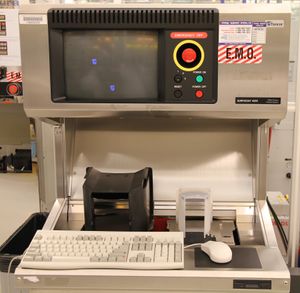Surface Analysis (KLA/Tencor Surfscan): Difference between revisions
Jump to navigation
Jump to search
Content deleted Content added
| (11 intermediate revisions by 2 users not shown) | |||
| Line 6: | Line 6: | ||
|location=Bay 5 |
|location=Bay 5 |
||
|description = Surface Analysis |
|description = Surface Analysis |
||
|manufacturer = KLA/Tencor |
|||
|manufacturer = Tencor |
|||
|materials = |
|materials = |
||
|toolid= |
|toolid= |
||
| Line 25: | Line 24: | ||
*[https://wiki.nanofab.ucsb.edu/w/images/2/29/Wafer_Particle_Count-Process_Traveler.pdf Wafer Scanning Instructions] |
*[https://wiki.nanofab.ucsb.edu/w/images/2/29/Wafer_Particle_Count-Process_Traveler.pdf Wafer Scanning Instructions] |
||
**''This is the procedure Staff uses to calibrate particle counts on our deposition tools. After the scan is complete you need to press ENTER on a small laptop. The Data will be saved on: Desktop/Local Disk(C)/Users/Public/Public Documentation] The data will be saved as a photo. |
**''This is the procedure Staff uses to calibrate particle counts on our deposition tools. After the scan is complete you need to press ENTER on a small laptop. The Data will be saved on: Desktop/Local Disk(C)/Users/Public/Public Documentation] The data will be saved as a photo.'' |
||
'' |
|||
| ⚫ | |||
* Surfscan instructions [wafers different size, and pieces]: |
|||
*[[Surfscan SOP for 4inch wafers]] |
|||
*[https://drive.google.com/drive/folders/1KfYJ4UcgIIlJof6tpLLz5wstzI7ureKx 8inch wafers] |
|||
*[https://drive.google.com/drive/folders/1A-EOaVv7BZ7LqBU-ootweDXzz8KXIF3s 6inch wafers] |
|||
*[https://drive.google.com/drive/folders/1EUoxJusqM7We6EMnK64aG08ijyCjwt3U 4inch wafers] |
|||
*[[Surfscan SOP for 6inch wafers]] |
|||
*[https://drive.google.com/drive/folders/1EUoxJusqM7We6EMnK64aG08ijyCjwt3U 4inch wafers] |
|||
*[https://drive.google.com/drive/folders/1ypVvJM5PEay0fwscYaWHG53XlYlmpJUF All kind of small substrates] |
|||
*[[Surfscan SOP for 8inch wafers]] |
|||
| ⚫ | |||
*[[Wafer scanning process traveler|Wafer Particle Count - Process Traveler]] |
* [[Wafer scanning process traveler|Wafer Particle Count - Process Traveler]] |
||
**'' Very detailed instructions |
|||
===Other Documentation=== |
===Other Documentation=== |
||
Latest revision as of 23:04, 20 November 2024
| ||||||||||||||||||||||||||
About
This system uses a laser-based scattering method to count size and distribution of particles (or other scattering defects) on a flat wafer surface.
It can scan wafers in size from 4 to 8 inches. Piece-parts are more difficult but can be scanned with a custom recipe.
4-inch wafers are the most standard size to measure.
For measuring very low particle counts accurately, purchase "low particle count" (LPC) wafers from a Silicon wafer vendor, and keep the wafers in the case and clean at all times until use.
Documentation
Operating Procedures
- Wafer Scanning Instructions
- This is the procedure Staff uses to calibrate particle counts on our deposition tools. After the scan is complete you need to press ENTER on a small laptop. The Data will be saved on: Desktop/Local Disk(C)/Users/Public/Public Documentation] The data will be saved as a photo.
- Surfscan SOP for small substrates (You must water-mount your small sample or wafer (2inch or 3 inch) to a carrier wafer)
- Wafer Particle Count - Process Traveler
- Very detailed instructions
Other Documentation
- Operations Manual
- For detailed measurement info, it is highly recommended that you read the manual.
Examples
| Gain 4: Small Particles
(0.160µm – 1.60µm) |
Gain 2: Large Particles
(1.60µm – 28.0µm) |
|---|---|
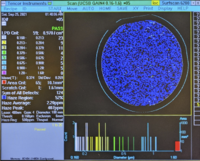
|
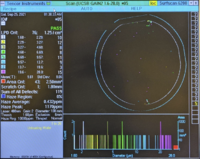
|
| Gain 4: Small Particles
(0.160µm – 1.60µm) |
Gain 2: Large Particles
(1.60µm – 28.0µm) |
|---|---|
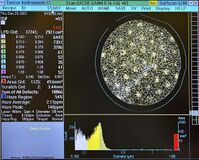
|
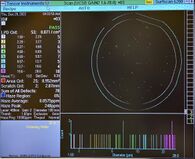
|
